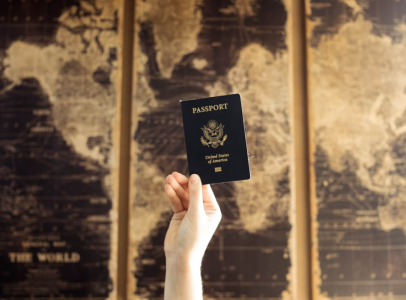Are you eligible for a second passport? Discover which countries could say yes to you
- Replies 0
Imagine sailing past long visa lines, stepping into a quiet café in a centuries-old village, or retiring by the beach with ease.
For a growing number of Americans, this dream is becoming reality through the rise of dual citizenship and second passports.
The movement is fueled by those who want more freedom, security, and opportunities abroad.
What once sounded like a luxury is now an attainable option for many who can trace their roots, relocate, or invest wisely.
A second passport isn’t just a fancy travel perk. It’s a powerful tool for expanding your horizons. Here’s what it can offer:

There are three main routes to a second passport:
Who Qualifies: If your parent or grandparent was an Italian citizen when you or your parent was born—and never renounced their citizenship—you could be eligible.
Why It’s Popular: Italian heritage is widespread in the U.S., and Italy’s rules are generous. With the right paperwork, you could soon be sipping espresso in Rome as a bona fide Italian citizen. Plus, Italian citizenship opens the door to living and working anywhere in the European Union.
What You’ll Need:
Who Qualifies: If you have a parent, grandparent, or great-grandparent who was a Polish citizen after 1920.
Why Consider Poland: The process is relatively quick (sometimes just a few months), and Polish citizenship grants you EU rights. If you’ve got Polish roots, this could be your ticket to Europe.
Who Qualifies: Live in Portugal for five years on a qualifying visa (like the digital nomad or golden visa), pass a language and culture test, and you’re in.
Why Portugal: Portugal is famous for its friendly locals, beautiful coastlines, and affordable living. The country offers a variety of visas, making it one of the most accessible EU countries for Americans seeking a new home base.
Who Qualifies: Prove your parents or grandparents were Spanish citizens, or live in Spain for ten years.
Special Note: Spain also recognizes adoption and offers a path for those adopted by Spanish families before age 18. The naturalization route is longer, but the rewards—think tapas, siestas, and Mediterranean living—are worth it.
Also read: Can you really fly unlimited for $299? Frontier’s GoWild! pass might make it possible
Who Qualifies: If your parent or grandparent was born in Ireland or held Irish citizenship, you can register your birth in the Foreign Births Register and claim your Irish passport.
Why Ireland: Irish citizenship is a golden ticket to the EU, and the process is straightforward if you have the paperwork. Plus, who wouldn’t want to celebrate St. Patrick’s Day as a true Irish citizen?
Who Qualifies: Live in Malta for four of the last six years under a residence permit.
Why Malta: Malta’s sunny climate, English-speaking population, and EU membership make it a top pick. The country also offers a digital nomad visa, which can be a stepping stone to permanent residency and citizenship.
Who Qualifies: Invest at least $400,000 in real estate (held for three years) or deposit $500,000 in a Turkish bank.
Why Turkey: Turkey’s program is one of the most affordable for investors, and the country’s unique blend of East and West is a draw for many.
Also read: Don’t book your next flight until you read these senior travel must-knows
Who Qualifies: Invest EUR 200,000–400,000 in real estate or business.
Why North Macedonia: It’s one of the least expensive citizenship-by-investment programs in Europe, and the process is relatively quick.
Who Qualifies: Make a non-refundable $150,000 donation to a government fund or invest $200,000 in real estate.
Why St. Kitts & Nevis: Immediate citizenship, no residency requirement, and a passport that allows visa-free travel to over 150 countries. Plus, you get to call a tropical paradise home.
Who Qualifies: Donate $100,000 to the National Economic Fund, invest $300,000 in real estate, or buy $500,000 in government bonds.
Why St. Lucia: Flexible investment options, quick processing, and a beautiful island lifestyle.
Read next: Planning your next getaway? Check these 18 senior travel discounts before you book!

Have you explored your family roots or considered a second passport? Are you dreaming of retiring abroad, or have you already made the leap?
For a growing number of Americans, this dream is becoming reality through the rise of dual citizenship and second passports.
The movement is fueled by those who want more freedom, security, and opportunities abroad.
What once sounded like a luxury is now an attainable option for many who can trace their roots, relocate, or invest wisely.
A second passport isn’t just a fancy travel perk. It’s a powerful tool for expanding your horizons. Here’s what it can offer:
- Travel Freedom: Access to more countries visa-free or with easier entry.
- Retirement Options: The ability to settle down in a new country, often with better healthcare or a lower cost of living.
- Family Security: A backup plan in times of political or economic uncertainty.
- Business Opportunities: Easier access to international markets and investments.
- Cultural Connection: A chance to reconnect with your roots or explore new cultures.

Whether it’s for adventure, security, or legacy, more of us are exploring what it means to be a citizen of the world. Image source: Annika Gordon / Unsplash
There are three main routes to a second passport:
- Citizenship by Descent: If your parents, grandparents, or even great-grandparents were born abroad, you might be eligible.
- Citizenship by Naturalization: Live in a country for a set number of years, learn the language, and you could qualify.
- Citizenship by Investment: Make a significant financial investment, and some countries will welcome you as a citizen.
1. Italy: Reclaim Your Roots
Type: Citizenship by Descent (Jure Sanguinis)Who Qualifies: If your parent or grandparent was an Italian citizen when you or your parent was born—and never renounced their citizenship—you could be eligible.
Why It’s Popular: Italian heritage is widespread in the U.S., and Italy’s rules are generous. With the right paperwork, you could soon be sipping espresso in Rome as a bona fide Italian citizen. Plus, Italian citizenship opens the door to living and working anywhere in the European Union.
What You’ll Need:
- Birth, marriage, and death certificates tracing your lineage
- Proof that your ancestor never renounced Italian citizenship
- Patience—the process can take time, but the reward is sweet!
2. Poland: A Fast Track for Descendants
Type: Citizenship by DescentWho Qualifies: If you have a parent, grandparent, or great-grandparent who was a Polish citizen after 1920.
Why Consider Poland: The process is relatively quick (sometimes just a few months), and Polish citizenship grants you EU rights. If you’ve got Polish roots, this could be your ticket to Europe.
3. Portugal: The Welcoming West Coast of Europe
Type: Citizenship by NaturalizationWho Qualifies: Live in Portugal for five years on a qualifying visa (like the digital nomad or golden visa), pass a language and culture test, and you’re in.
Why Portugal: Portugal is famous for its friendly locals, beautiful coastlines, and affordable living. The country offers a variety of visas, making it one of the most accessible EU countries for Americans seeking a new home base.
4. Spain: For the Patient and the Connected
Type: Citizenship by Descent or NaturalizationWho Qualifies: Prove your parents or grandparents were Spanish citizens, or live in Spain for ten years.
Special Note: Spain also recognizes adoption and offers a path for those adopted by Spanish families before age 18. The naturalization route is longer, but the rewards—think tapas, siestas, and Mediterranean living—are worth it.
Also read: Can you really fly unlimited for $299? Frontier’s GoWild! pass might make it possible
5. Ireland: The Luck of the Irish (and Their Descendants)
Type: Citizenship by DescentWho Qualifies: If your parent or grandparent was born in Ireland or held Irish citizenship, you can register your birth in the Foreign Births Register and claim your Irish passport.
Why Ireland: Irish citizenship is a golden ticket to the EU, and the process is straightforward if you have the paperwork. Plus, who wouldn’t want to celebrate St. Patrick’s Day as a true Irish citizen?
6. Malta: Mediterranean Living Made Easy
Type: Citizenship by NaturalizationWho Qualifies: Live in Malta for four of the last six years under a residence permit.
Why Malta: Malta’s sunny climate, English-speaking population, and EU membership make it a top pick. The country also offers a digital nomad visa, which can be a stepping stone to permanent residency and citizenship.
7. Turkey: Invest and You’re In
Type: Citizenship by InvestmentWho Qualifies: Invest at least $400,000 in real estate (held for three years) or deposit $500,000 in a Turkish bank.
Why Turkey: Turkey’s program is one of the most affordable for investors, and the country’s unique blend of East and West is a draw for many.
Also read: Don’t book your next flight until you read these senior travel must-knows
8. North Macedonia: Europe’s Budget-Friendly Option
Type: Citizenship by InvestmentWho Qualifies: Invest EUR 200,000–400,000 in real estate or business.
Why North Macedonia: It’s one of the least expensive citizenship-by-investment programs in Europe, and the process is relatively quick.
9. St. Kitts & Nevis: Caribbean Paradise, No Strings Attached
Type: Citizenship by InvestmentWho Qualifies: Make a non-refundable $150,000 donation to a government fund or invest $200,000 in real estate.
Why St. Kitts & Nevis: Immediate citizenship, no residency requirement, and a passport that allows visa-free travel to over 150 countries. Plus, you get to call a tropical paradise home.
10. St. Lucia: The Caribbean’s Best-Kept Secret
Type: Citizenship by InvestmentWho Qualifies: Donate $100,000 to the National Economic Fund, invest $300,000 in real estate, or buy $500,000 in government bonds.
Why St. Lucia: Flexible investment options, quick processing, and a beautiful island lifestyle.
Read next: Planning your next getaway? Check these 18 senior travel discounts before you book!
Key Takeaways
- A growing number of Americans are seeking second passports, with many countries offering relatively straightforward paths to citizenship through ancestry, residency, or investment.
- Italy, Poland, Spain, and Ireland allow individuals to apply for citizenship by descent if they can prove their parents or grandparents were citizens, giving many people with European ancestry an easy path to a second passport.
- Countries such as Portugal and Malta offer citizenship by naturalization after several years of legal residency, often with requirements like language or cultural tests.
- Citizenship by investment is available in places like Turkey, North Macedonia, St. Kitts & Nevis, and St. Lucia, where significant financial contributions can result in a quick second passport.






